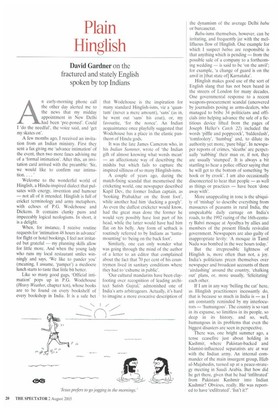Plain Hinglish
David Gardner on the fractured and stately English spoken by top Indians
An early-morning phone call the other day alerted me to the news that my midday appointment in New Delhi had been 'pre-poned". Could I 'do the needful', the voice said, and 'get my skates on'.
A few months ago, I received an invitation from an Indian ministry. First they sent a fax giving me `advance intimation' of the event, then two more faxes advising me of a 'formal intimation'. After this, an invitation card arrived with the preamble: 'Sir, we would like to confirm our intimation.... '
Welcome to the wonderful world of Hinglish, a Hindu-inspired dialect that pulsates with energy, invention and humour — not all of it intended. Hinglish is full of cricket terminology and army metaphors, with echoes of P.G. Wodehouse and Dickens. It contains clunky puns and impeccably logical neologisms. In short, it is a delight.
When, for instance, I receive routine requests for 'intimation 48 hours in advance' for flight or hotel bookings, I feel not irritated but grateful — my planning skills allow for little more. And when the young lady who runs my local restaurant smiles winningly and says, 'We like to pander you' (meaning, I assume, 'pamper') a mediocre lunch starts to taste that little bit better.
Like so many good gags, 'Official intimation' pops up in P.G. Wodehouse (Heavy Weather, chapter ten), whose books are to be found on every bookshelf of every bookshop in India. It is a safe bet that Wodehouse is the inspiration for many standard Hinglish-isms, viz a 'quantum' (never a mere amount), `sans' (as in, he went out 'sans' his coat), or, my favourite, 'for the nonce'. An Indian acquaintance once playfully suggested that Wodehouse has a place in the elastic pantheon of Hindu gods.
It was the late James Cameron who, in his Indian Summer, wrote of `the Indian gift of almost knowing what words mean' — an affectionate way of describing the mishits but which fails to capture the inspired silliness of so many Hinglish-isms.
A couple of years ago, during the match-fixing scandal that mesmerised the cricketing world, one newspaper described Kapil Dev, the former Indian captain. as 'hooking Prabakhar on the front foot', while another had him 'ducking a googly'. As even the duffest cricketer would know, had the great man done the former he would very possibly have lost part of his head, while the latter would have had him flat on his belly. Any form of setback is routinely referred to by Indians as `tantamounting' to 'being on the back foot'.
Similarly, one can only wonder what was going through the mind of the author of a letter to an editor that complained about the fact that 70 per cent of his countrymen lived in sanitary conditions where they had to `exhume in public'.
'Our cultural mandarins have been clayfooting over recognition of leading architect Satish Gujral,' admonished one of India's arts arbitrageurs. Actually, it's hard to imagine a more evocative description of the dynamism of the average Delhi babu or bureaucrat.
Babu-isms themselves, however, can be irritating, and frequently jar with the mellifluous flow of Hinglish. One example for which I suspect babus are responsible is that anything which is pending — from the possible sale of a company to a forthcoming wedding — is said to be 'on the anvil'; for example, 'a change of guard is on the anvil in [that state of] Karnataka'.
Hinglish makes good use of the sort of English slang that has not been heard in the streets of London for many decades. One governmental response to a recent weapons-procurement scandal (uncovered by journalists posing as arms-dealers, who managed to bribe 34 politicians and officials into helping advance the sale of a fictitious device lifted from the pages of Joseph Heller's Catch 22) included the words 'piffle and poppycock', 'balderdash', 'tomfoolery', 'humbug' and, to dilute its authority yet more, 'pure bilge'. In newspaper reports of crimes, 'sleuths' are perpetually `nabbing' their man or, if not, they are usually 'stumped'. It is always a bit startling to hear a police officer saying that he will get to the bottom of something 'by hook or by crook'. I am also occasionally disconcerted to hear that people — as well as things or practices — have been 'done away with'.
More unappealing in tone is the ubiquity of 'mishap' to describe everything from massacres of peasants in rural India, the unspeakable daily carnage on India's roads, to the 1992 razing of the 16th-century Babri mosque at Ayodhya by allies and members of the present Hindu revivalist government. Newspapers are also guilty of inappropriate levity: 'A mosque in Tamil Nadu was bombed in the wee hours today.'
But the irrepressible lightness of Hinglish is, more often than not, a joy. India's politicians preen themselves over newspaper and broadcast accounts of them `airdashing' around the country, 'chalking out' plans, or, more usually, 'felicitating' each other.
If I am in any way 'belling the cat' here, as Hinglish practitioners incessantly do, that is because so much in India is — as I am constantly reminded by my interlocutors — thumungous'. The country is so vast in its expanse, so limitless in its people, so deep in its history, and so, well, humungous in its problems that even the biggest disasters are seen in perspective.
There was, one bright summer ago, a tense ceasefire just about holding in Kashmir, where Pakistan-backed and Islamist-influenced separatists are at war with the Indian army. An internal commander of the main insurgent group, Hizb ul-Mujahedin, turned up at a peace-strategy meeting in Saudi Arabia. But how did he get there, given that he had 'infiltrated' from Pakistani Kashmir into Indian Kashmir? Obvious, really. He was reported to have `exfiltrated'. 'Isn't it?'


























































 Previous page
Previous page